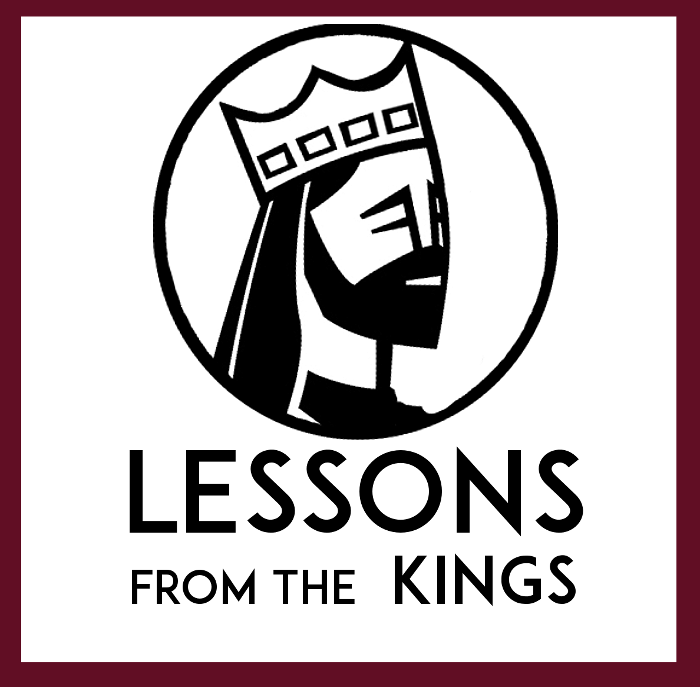Our Adult Discipleship group (a midweek Bible class) is going through the Kings of Israel and Judah. You are welcome to join us for any session in person or online. See the calendar for dates. [View Series]
This chart is a map of our course of study. We will go chronologically king by king.
(Ahaz) Who you gonna call?
When a child falls and gets hurt, where do they most often run? In contrast, when a gangster gets hurt, where does he turn? Read 2 Chronicles 28:16-27 to see how Ahaz displays just the opposite of childlike faith in his Savior God. List the sources of help he turned to in trouble.
“In his time of trouble King Ahaz became even more unfaithful to the Lord.” (2 Chronicles 28:22) God often sends trouble to cause us to repent or bring us to rely more on him. He did that for Ahaz and the people of Israel. Explain why the opposite results will often occur.
“He offered sacrifices to the gods of Damascus, who had defeated him; for he thought, ‘Since the gods of the kings of Aram have helped them, I will sacrifice to them so they will help me.’” (2 Ch 28:23) What apparent sources of strength in this world can become false idols for us?
Ahaz was left as a vassal of Assyria. Explain different ways that the expression is true, “Everyone who sins is a slave to sin.”(John 8:34)
Read Isaiah 7:3-14 for God’s promise of peace to Ahaz and his people during times of trouble and fear. List all the enemies our King has defeated that we might trust in him forever.
King Hezekiah
Hezekiah was able to recall the kingdom of his grandfather from when he was young. Under Jotham and his father, Uzziah, the kingdom had reached a height of glory unlike any other since the time of David and Solomon. But he witnessed the ruin of it all by his father, Ahaz. Under Ahaz Judah became a vassal to Assyria and the temple doors were closed.
With a determination to restore Judah he instituted a revival unlike any other in the face of some of the greatest challenges. The people responded by destroying all the shrines to idols and with great dedication to the Lord. His revival and invitation to Israel to celebrate the Passover was enthusiastically accepted.
He made two attempts to regain independence from Assyria. The first failed. The second succeeded when the Lord destroyed the army of King Sennacherib which was besieging Jerusalem. During this siege the people of Jerusalem displayed great loyalty. The prophet Isaiah assured them of the Lord’s promises.
*note, there is difficulty in the timeline for Hezekiah due to 2 Kings 18. It mentions the fall of Israel as taking place in Hezekiah’s sixth year (722). But the siege by Sennacherib is listed as taking place during his 14th year. (702). One of the best solutions is to keep all the historical dates in place but understand that Hezekiah had a coregency with his father. His official full reign begins when his father dies in 715. (Recall that Hezekiah’s grandfather, Jotham had a coregency due to Uzziah’s illness. This practice evidently continued as pro-Assyrian and anti-Assyrian factions struggled for a claim over the rule of Judah.) Sometimes a king was dated according to events in the north. This appears to be the case in2 Kings 18 even though he remained a co-regent. (for further study see http://wartburgproject.org/?mdocs-file=1596)
Read about Hezekiah: 2 Kings 18 – 20; 2 Chronicles 29 – 32; Isaiah 36 – 39
Return to The Remnant
Describe a time you were eager to carry out a plan but had to wait until you could enact it. How did you feel when you finally got to act on your plans? There is a sense of urgency in Hezekiah’s reform efforts. Hezekiah’s father died in 715, making his son the sole ruler of Judah. (Before this time, it appears he was a co-regent, see timeline note above regarding 2 Kings 18.) After the death of Hezekiah’s godless father, he immediately began to reform the worship life of the people. Read 2 Chronicles 29:3-11.
List some reasons why the people of Judah and the priests would have been so eager to join Hezekiah.
Israel fell to Shalmaneser king of Assyria in 722 BC at the destruction of Samaria. Many were deported, but many also remained behind. Hezekiah did not forget his Israelite brothers in his reform efforts. He invited the now decimated people of the north to reunite with him as a godly king. Read 2 Chronicles 30:1-11. How did the people in the north respond?
How does the response of the northern Israelites reflect what the Church still sees happening today?
While it is easy to focus on the great number of people who disregard the call for spiritual revival, what should we be focusing on as we call others to join us in true worship?

